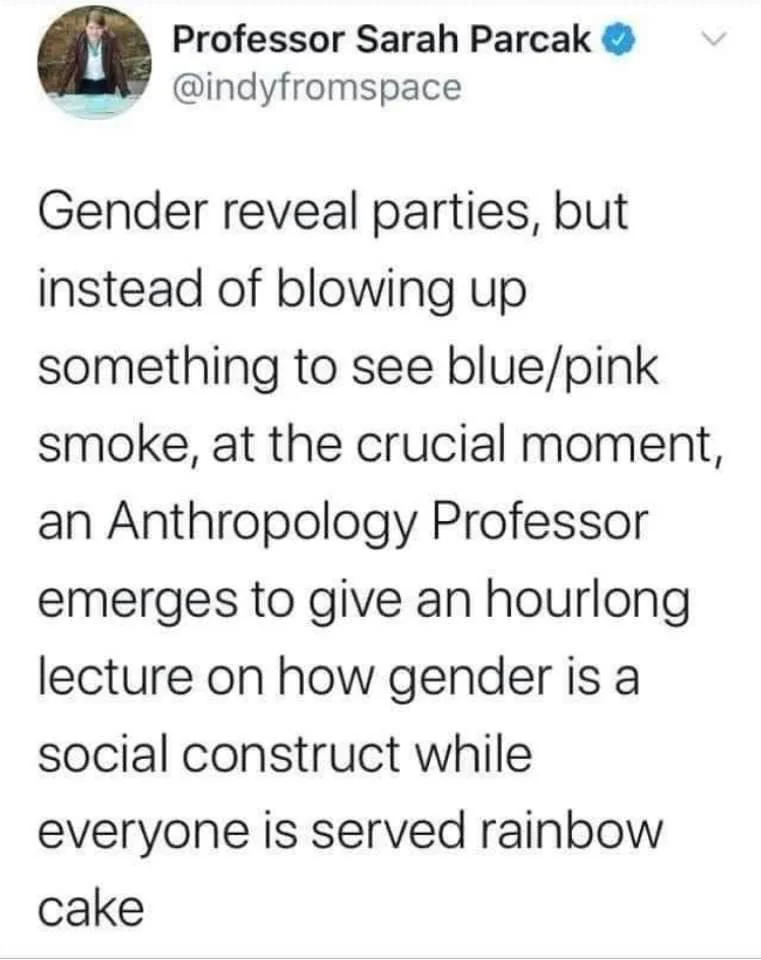this post was submitted on 14 Jan 2024
827 points (86.4% liked)
Science Memes
11189 readers
3470 users here now
Welcome to c/science_memes @ Mander.xyz!
A place for majestic STEMLORD peacocking, as well as memes about the realities of working in a lab.

Rules
- Don't throw mud. Behave like an intellectual and remember the human.
- Keep it rooted (on topic).
- No spam.
- Infographics welcome, get schooled.
This is a science community. We use the Dawkins definition of meme.
Research Committee
Other Mander Communities
Science and Research
Biology and Life Sciences
- !abiogenesis@mander.xyz
- !animal-behavior@mander.xyz
- !anthropology@mander.xyz
- !arachnology@mander.xyz
- !balconygardening@slrpnk.net
- !biodiversity@mander.xyz
- !biology@mander.xyz
- !biophysics@mander.xyz
- !botany@mander.xyz
- !ecology@mander.xyz
- !entomology@mander.xyz
- !fermentation@mander.xyz
- !herpetology@mander.xyz
- !houseplants@mander.xyz
- !medicine@mander.xyz
- !microscopy@mander.xyz
- !mycology@mander.xyz
- !nudibranchs@mander.xyz
- !nutrition@mander.xyz
- !palaeoecology@mander.xyz
- !palaeontology@mander.xyz
- !photosynthesis@mander.xyz
- !plantid@mander.xyz
- !plants@mander.xyz
- !reptiles and amphibians@mander.xyz
Physical Sciences
- !astronomy@mander.xyz
- !chemistry@mander.xyz
- !earthscience@mander.xyz
- !geography@mander.xyz
- !geospatial@mander.xyz
- !nuclear@mander.xyz
- !physics@mander.xyz
- !quantum-computing@mander.xyz
- !spectroscopy@mander.xyz
Humanities and Social Sciences
Practical and Applied Sciences
- !exercise-and sports-science@mander.xyz
- !gardening@mander.xyz
- !self sufficiency@mander.xyz
- !soilscience@slrpnk.net
- !terrariums@mander.xyz
- !timelapse@mander.xyz
Memes
Miscellaneous
founded 2 years ago
MODERATORS
you are viewing a single comment's thread
view the rest of the comments
view the rest of the comments

I think if "you wouldn't" make that argument, because it's reductive, then you should refute it, after you have spelled out the narrative in your comment. I would appreciate that. Or just point me in the right direction idk that might be good enough.
My personal view is that you should always be wary of people asserting "this is how it is". We're in a science sub; we know that the purpose of a hypothesis is to rigorously attempt to disprove it and find counterexamples.
To discuss an area that I know some specifics about and can be more confident on: the historiography of the French revolution. Starting with George's Lefebvre, the Marxist historians had a clear idea of what the revolution represented: a movement from the feudal mode of production to the capitalist, and so while their work is incredibly important and academically worth studying, they also tend to go into their work with a clear idea of what they wanted to find. So when the revisionists (starting with Cobban) come along, they find a lot of inconsistencies; the facts of the period don't directly align with what the Marxist narratives wanted it to be (e.g. Cobban's disagreement is that he thinks the feudal mode was near extinct by the time of the Revolution, and that it was more a political conflict than social).
Bringing it back to your question: I disagree with the narrative I put because I think reductive narratives aren't helpful, and cause us to miss a lot of nuance. The nuclear family was dominant in England from the 13th Century onwards, but to leave it there misses a host of interesting social structures and changes (e.g. the role of the church and monasteries as social institutions that exist wholly separate from the family). Moreover, I don't think it's helpful to use the past as a suggestion for how we should build our future. The 'return to tradition' that's suggested often has an idealised view of the past that misses all this nuance. The narrative around 'ancient greek masculinity', for instance, conveniently misses off their ideas around pederasty, which we perceive as abhorrent today.
As for reading, Foucault on how we like to categorise everything is quite interesting. If reading isn't your cup of tea, the Thinking Allowed podcast from the BBC has an episode on Foucault that covers him that's worth listening to.